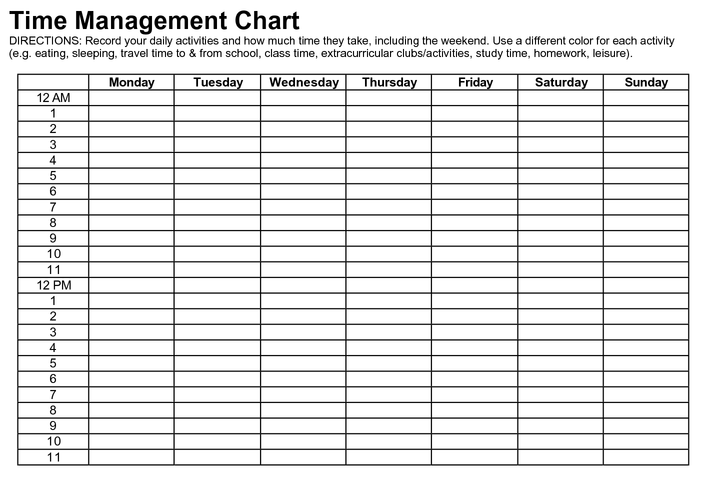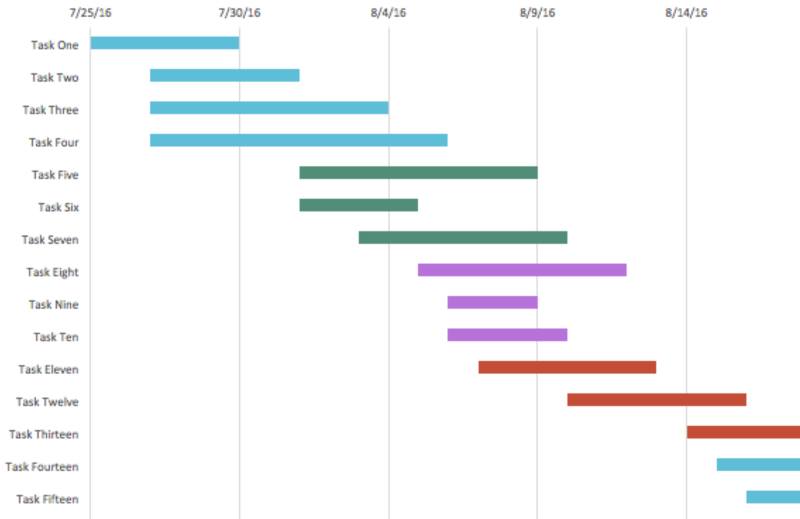10 Essential Time Management Strategies
Time Management – A word, most of us are familiar with. But, is it really a management of time, we talk about? If you go by its literal meaning it says about managing the time – Is it possible?
Not Really! We cannot manipulate the time. The terminology – “TIME MANAGEMENT” is a misnomer, which confuses us. But, we all know that each of us has only 24 hours in a day or 1440 minutes in a day or more precisely, 86400 seconds in a day – Now, sounds relaxing, isn’t it? Yes, we all have 86400 seconds – rather ONLY 86400 seconds in a day to complete our daily tasks. You’ll be stunned that despite of having 86400 seconds in a day, still people cry about time shortage – they are unable to manage these 86400 seconds to complete even 60 - 70% of targeted work of the day. …Why?
In this article, we’ll learn - how to improve time management, different ways to improve work performance. We’ll see time management examples. We’ll have time management discussion with a business scenario study.
What is Time Management?
What is Time Management? –By now, you must be wondering.
So let’s define - what is time management or more appropriately, what does time management mean in reality!
“Time management” is to improve your work performance in order to make you capable of completing your tasks in a timely manner.
Why is time management skill important?
Is time management important for everyone? Yes, time management is a need of today. Whatever profession, you are in, at any level or cadre in a job, time management is essential. Even, time management is important in managing your day-to-day activities at home. Because we have limited time and we are expected to fully justify the use of this limited time in productive work. Believe me, time management is not easy to do. If you are stressed at work, because you frequently loose the sight from your targeted tasks; you feel distressed because you couldn’t complete your assigned tasks; you often get distracted or deviated from your tasks and fail to complete those in time; - Then, you might be a victim of poor time management. Thus, time management is one of the most important areas of improvement for managers in today’s scenario.
How to improve time management?
So, now we understand that good time management is very important. But, question arises – How to improve time management, then?
Let me ask you first, how is your time management skill?
If you also encounter the same situations, while at work or facing the challenges on, how can you improve your time management skills? Believe me this article is worth reading for you. I’ll list down for you the tips from my experiences and learning to help you improve your time management skills, which in turn improves managerial skills. The more you practice them by heart, the more you’ll develop effective time management skills.
Takeaway: If you are good at time management in the workplace, you are a good manager at your workplace. Because with good time management skills, you’ll be able to manage all your activities effectively and efficiently. Stress and time management have direct negative correlation. Hence, if you improve your time management skills, you can zero down your stress level drastically.
Setting daily goals at your workplace is a good time management strategy:
a). Set your daily goals, which should be specific and relevant to your job profile. Remember! These goals should be stretched but yet achievable. The best way is to break these daily goals into chunks of small manageable activities of shorter time targets, say - 30 minutes or an hour, because achieving these short –term milestones will motivate you further to achieve your overall daily goals.
b). Track your performance against these goals at the end of the day with tools like time clock calculator. This will help you to keep an eye on your progress towards improving work performance. For better results, you can also track the performance of short-term chunks by setting stopwatch on your cell phone for each hour. I leave it up to you for deciding on the approach to track your daily performance, but essentially you have to do it.
c). Take immediate actions, while you notice you are off the target or not meeting deadlines. Important tip: Try delegating tasks to achieve more in shorter time.
What are the other ways to improve time management?
Since time management is so significant in everyone’s life and is one of the important areas of improvement for managers, now it’s time to learn the different ways to improve time management with time management skills examples:
1). Don’t procrastinate: Procrastination decreases your productivity and increases the stress level, especially when you are nearing to the deadlines. Hence, avoid it.
2). Schedule yourself: As already, we have discussed the importance of daily goal setting, daily scheduling of your tasks will keep you on track and improve your time management practices.
3). Prepare Must – do list rather than To – do list: Often there is a misconception among managers that time management is to manage lots of activities and multi-tasking. Let me clarify that good time management has nothing to do with multitasking, rather it is all about completing your important tasks within stipulated time frame. So don’t linger over unimportant tasks. Identify, which tasks are important at that particular time frame and focus on those only.
4). Stay away from distractions: Block out all the distractions from your workplace, while you are at work. This will keep you concentrated on achieving your tasks. Most of the managers have the habit of checking messages or mails notifications frequently during their work, which reduces their potential productivity. Always set aside a shorter time frame out of your daily time management to check these notifications and send replies. This time should not hamper your productivity at any cost, while on task. Don’t check notifications frequently, until or unless your job is to do the same.
5). Prioritize your tasks: Always build the habit of prioritizing your tasks, as we have discussed earlier – unimportant tasks drain your energy and consume your time, which needs to be dedicated for urgent and important tasks.
6). Delegate some tasks: Don’t try to do everything on your own. As a manager, you need to get your work done, but it doesn’t mean you have to do all your work by yourself. Delegate some of the tasks to your colleagues or subordinates. Make your subordinates feel empowered. This will help you complete all your targeted tasks efficiently. Some of the tasks may need special expertise. Don’t hesitate to take the help of your colleagues or peers - expert in that area. Some of the tasks may demand only supervision from your side, don’t get fully engaged into completing these tasks.
7). Good housekeeping: Practicing good housekeeping methodology such as 5S will keep you organized and will help you save precious time at your workplace. 5S, A Japanese methodology consists of 5 steps in order starting each with “S”, - “Seiri”, “Seiton”, “Seiso”, “Seiketsu” and “Shitsuke”, which means, at your workplace:
set everything in order,
identify and tag everything,
keep everything clean,
practice the above each day
standardize the above as your daily routine in a disciplined manner.
Keeping everything organized and clean will save your time to access resources, whenever you need those urgently. Hence you won’t waste your time searching the required stuff. A good example of “5S” practice is supermarket.
8). Keep yourself stress free: Avoid taking stress at your workplace. Stress eventually reduces your productivity and substantially affects your health. It is always advisable to take a short break of 5 – 10 minutes, whenever you are at the task for longer duration. Enjoy every moment with your colleagues and family, whenever you are off the work. Relax and re – energize yourself.
9). Have courage to say NO: Most of the managers don’t have courage to say no while they are assigned works beyond their capacity or limit. And they eventually land up in taking high stress, when they are unable to complete the tasks in time. Hence, a smart way is to say “No” politely to further tasks being assigned to you, when you are already overloaded with work. Don’t make false commitment.
10). Review daily progress: Keeping track of your daily performance as scheduled is very important to hone good time management skills. You can also record your activities at different times in a day by using Time Management Chart. This is one of the most effective time management strategies. In this chart, you can record your daily activities along with time taken by these activities. This will help you identify your productive and non-productive time. When you start tracking your non-productive time, you get the opportunity to work upon to reduce or eliminate it. Post that revise your time management goals to improve your efficiency. Please refer to the sample of Time Management chart for better understanding.
Figure 1: Sample of time management chart

Good Time Management Vs Bad Time Management:
A good time management is always rewarding for you – professionally or personally, while bad time management always costs you: We’ve seen lots of time management examples and tips above to support my statement.
Consider a case to understand what is time management in business scenario:
Suppose, you are a project manager of a start – up, which is at a very early stage of its product introduction to the market. Market is very competitive and dynamic for the kind of product, your company is offering, i.e. early product launcher reaps all the benefits. Now, you have tremendous pressure from your management to introduce this product asap into the market. You have been given the deadline of a month for the product launch. Now, you are working on strategies to introduce this product into market within given time frame.
Let me ask you, if you have to make this project successful, what must be given due consideration?
Obviously, your answer would be “Good Time Management”, wouldn’t it?
There are also some tools for project manager to help him plan and maintain good time management in his project. These are known as scheduling tools. Gantt chart and PERT chart are some tools among others. These charts can be easily created with the help of some scheduling software available in the market such as MS Project. Below is a sample of Gantt chart for better understanding:
Figure 2: Scheduling in a project

Image Source: https://d33wubrfki0l68.cloudfront.net
In above Gantt chart, Vertical axis represents different project tasks, Horizontal axis represents time intervals and colored bars represent proposed time taken by each task with definite start and end dates.
This scheduling tool helps project manager to perform different tasks within respective assigned time frame in order to launch his product into the market in stipulated time.
However, note that this tool is only a reference tool for project manager to help him with time management planning and tracking. But along with this, he needs to consider all above time management tips in order to materialize his planning to execution.
So, good time management is very important in today’s scenario, which demands your dynamic and agile approach.
Common areas of improvement for managers:
Apart from time management skills, there are some other ways to improve work performance, which managers can work upon to increase their productivity:
Relationship management: Make good relationships with your colleagues and subordinates. Try to be socially engaged with them. Good relations with subordinates always motivate them to work for you. Some chit- chat at coffee corner with colleagues and subordinates will help you releasing your work stress too.
Communication: Good and proper communication helps you deliver your views and opinions effectively. Communication doesn’t mean only oral communication. Your expressions and your body language also communicate a lot. Possess good communication skills by practicing “Walk the Talk”.
Upgrade your skills: In today’s era, you need to regularly work upon upgrading your skillset. There is no fixed age of learning. Identify your weaknesses and get yourself trained on those. Nowadays, there are a lot of learning and training platforms for working professionals, like online training programs, virtual chat rooms, learning through video conferencing, weekend training programs to help them get equipped with new skills or improve their existing skills.
Share your experiences: Always share your good or bad experiences with your subordinates. This will help them to prepare themselves for similar situations in future. This will also help you refresh the learning from your past experience.
Time management in the work place:
Now you understand, how to be a good time manager. A good time management is a skill - The more you practice it, the more you master it.
Work will be fun, if you possess good time management skills. Good time management makes you organized and trustworthy.
Takeaways:
Remember, below steps to improve time management:
- Set your daily goals and make plans to achieve them, at the start of each day
- Possess good time management skills to achieve your goals as scheduled
- Practice the tips for good time management at work
- Reward yourself after achieving your goals
Also, we have learnt about these three ways to improve work performance in the workplace:
Good time management
Maintain cordial relationship with colleagues and subordinates
Keep upgrading your skills
In a nutshell, to be a good manager at your workplace, practice good time management skills day-in day-out. I hope, this article helps you to understand - what are good time management skills and their examples and how to improve time management.
As we’ll are excited to welcome New Year. Please be sure to improve time management and improve managerial skills as a resolution for upcoming year and start a journey to success in your personal and work life with the benefits of good time management skills.
Wish you a happy New Year and great success ahead!
Happy reading and learning!
